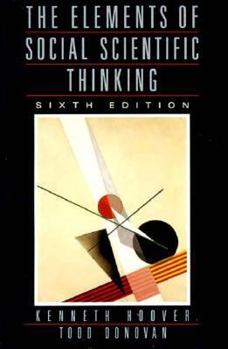Elements of Social Scientific Thinking
Select Format
Select Condition 
Book Overview
This volume is a basic introduction to the vocabulary, concepts, and objectives of social scientific thought. It aims to orient students to the research methods course for both consumers and producers of social science research. The authors ask such questions as: Where do concepts come from? What is a variable? Why bother with scientific thinking?
Format:Paperback
Language:English
ISBN:0312096437
ISBN13:9780312096434
Release Date:January 1994
Publisher:W.H. Freeman & Company
Length:201 Pages
Weight:0.40 lbs.
Dimensions:0.6" x 5.5" x 8.3"
Customer Reviews
2 ratings
Wonderfully lucid
Published by Thriftbooks.com User , 14 years ago
This book is an absolutely superb introductory overview of scientific goals, methods, capabilities, and limitations. In other words, it's an introduction to the philosophy of science but, because the book is written by practicing social scientists, it doesn't have all the obfuscating and dry technicalities typically found in books written by philosophers of science. The result is that this book is wonderfully lucid, with writing which is fairly informal and always cuts right to the essence. I'm not surprised that it's in its tenth edition. The examples and case studies in the book emphasize social science, which has the benefit of showing what science has to contend with in perhaps its most challenging domain. By comparison, the mathematical sophistication required for physics is daunting, but physics is also much "cleaner" than the messy world of human affairs. Chemistry, biomedicine, etc. are somewhere in between. Yet, despite the emphasis on social science, nearly all of the wise insights presented in this book are applicable to all branches of science. Because I can't possibly improve on the writing of the authors, I've summarized these insights below by quoting liberally from the book. Needless to say, I highly recommend this book to anyone interested in science, ranging from general readers to practicing scientists. ________________ Excerpts summarizing key points from the book: "By testing thoughts against observations of reality, science helps liberate enquiry from bias, prejudice, and just plain muddle-headedness." "Science has to do with the way questions are formulated and answered; it is a set of rules and forms for inquiry created by people who want reliable answers." "The scientific way of thought is one of a number of strategies by which we try to cope with a vital reality: the uncertainty of life." "Science is a process of thinking and asking questions, not a body of knowledge. It is one of several ways of claiming that we know something. In one sense, the scientific method is a set of criteria for deciding how conflicts about differing views of reality can be resolved. It offers a strategy that researchers can use when approaching a question. It offers consumers of research the ability to critically assess how evidence has been developed and used in reaching a conclusion." "... judgment plays a crucial role in how scientific evidence is gathered and evaluated." "If there is doubt about the validity of what has been done, the study itself can be double-checked, or 'replicated', to use the technical term." "It is in the realm of discovery that science becomes a direct partner of imagination." "To call a thing by a precise name is the beginning of understanding, because it is the key to the procedure that allows the mind to grasp reality and its many relationships." "The huge stock of concepts in language creates enormous possibilities for linking up variables to explain events. People have muddled around for
A book to nurture your own inner innovation
Published by Thriftbooks.com User , 15 years ago
The Elements of Social Scientific Thinking is an excellent premier for those seeking to undertake serious research into any social science topic. The Kenneth Hoover and Todd Donovan book seeks to enable the reader with the modern tools to conduct meaning studies that may contribute to any epistemic community of interest. Being a candidate for a doctorate in public policy, the work of the authors walked through important elements of concepts, variables, hypotheses, measurements and theories in wonderful detail. Personally, I found the "participatory action research" model a tool to use in the future. This book will be retained in my library as a tool and guide on how to best undertake my own detailed concepts, variables, hypotheses, measurements and theories to a participatory action research in commercial space policy. Therefore, I do recommend this book to any bona fide university student conducting any serious research or academic writing project. In the alternate, I would recommend this book to any person seeking to better understand contemporary research in the wide array of social science topics. It is worth both the read and the money.





